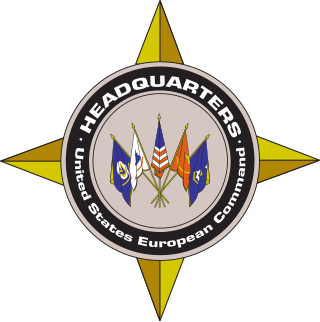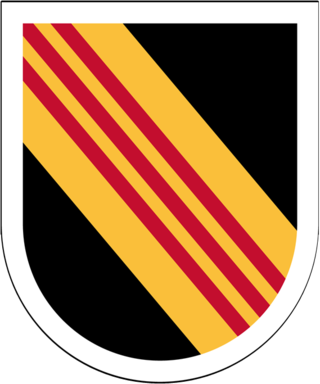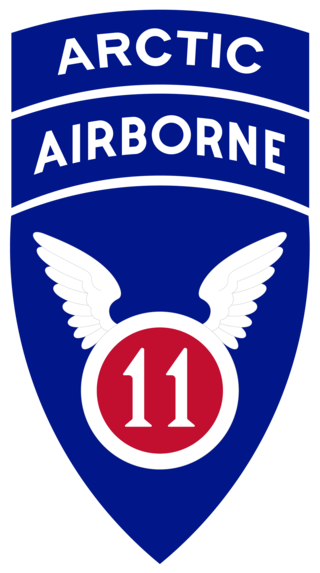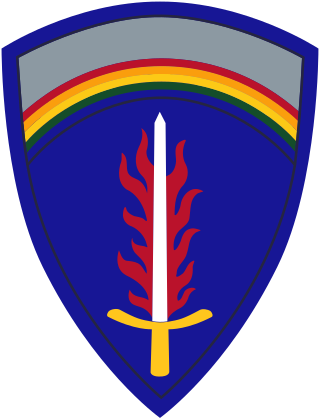
The 82nd Airborne Division is an airborne infantry division of the United States Army specializing in parachute assault operations into hostile areas with a U.S. Department of Defense mandate to be "on-call to fight any time, anywhere" at "the knife's edge of technology and readiness." Primarily based at Fort Liberty, North Carolina, the 82nd Airborne Division is part of the XVIII Airborne Corps. The 82nd Airborne Division is the U.S. Army's most strategically mobile division.

The U.S. Military Assistance Command, Vietnam (MACV) was a joint-service command of the United States Department of Defense, composed of forces from the United States Army, United States Navy, and United States Air Force, as well as their respective special operations forces.

The United States European Command (EUCOM) is one of the eleven unified combatant commands of the United States military, headquartered in Stuttgart, Germany. Its area of focus covers 21,000,000 square miles (54,000,000 km2) and 51 countries and territories, including Europe, The Caucasus, Russia and Greenland. The Commander of the United States EUCOM simultaneously serves as the Supreme Allied Commander, Europe (SACEUR) within NATO, a military alliance. During the Gulf War and Operation Northern Watch, EUCOM controlled the forces flying from Incirlik Air Base.

The 187th Airborne Infantry Regiment (Rakkasans) is a regiment of the 101st Airborne Division.
The 2nd Brigade Combat Team, 1st Infantry Division, also known as the Dagger Brigade, is a maneuver brigade combat team in the 1st Infantry Division of the U.S. Army stationed in Fort Riley, Kansas.

The 325th Infantry Regiment is an infantry regiment of the 82nd Airborne Division. The regiment serves as the 82nd Airborne's light infantry parachute insertion fighting force of the United States Army, with a long and distinguished history, having taken part in World War I, World War II, the Vietnam War, the invasions of Grenada and Panama, as well as the Gulf and Iraq Wars. The subordinate units of the regiment constitute the bulk of the infantry elements assigned to the 2nd Infantry Brigade Combat Team, 82nd Airborne Division.

The 505th Parachute Infantry Regiment, originally the 505th Infantry Regiment, is an airborne infantry regiment of the United States Army, one of four infantry regiments of the 82nd Airborne Division of the United States Army, with a long and distinguished history.

The Khmer National Armed Forces were the official armed defense forces of the Khmer Republic, a short-lived state that existed from 1970 to 1975, known today as Cambodia. The FANK was the successor of the Royal Khmer Armed Forces (FARK) which had been responsible for the defense of the previous Kingdom of Cambodia since its independence in 1953 from France.

The 5th Special Forces Group (Airborne) (5th SFG (A), 5th Group) is one of the most decorated active duty United States Army Special Forces groups. The 5th SFG (A) saw extensive action in the Vietnam War and played a pivotal role in the early months of Operation Enduring Freedom. 5th Group is designed to deploy and execute nine doctrinal missions: unconventional warfare, foreign internal defense, direct action, counter-insurgency, special reconnaissance, counter-terrorism, information operations, counterproliferation of weapon of mass destruction, and security force assistance.
The red beret is a military beret worn by many military police, paramilitary, commando, and police forces and should not be confused with the maroon beret worn by airborne troops all around the world.
Brigadier General U.S. Army (ret) Michael C. Flowers, is a former commander of the Joint POW/MIA Accounting Command (JPAC). The mission of JPAC is to achieve the fullest possible accounting of all Americans missing as a result of the nation's past conflicts. Michael C. Flowers is currently the Chief Operating Officer of DigiFlight, Inc. He has been with the company in several roles since 2008. He has been instrumental in the growth of DigiFlight’s Aerospace and Aviation business units and the overall continued growth for the company.

The 2nd Infantry Brigade Combat Team (Airborne), 11th Airborne Division is an airborne infantry brigade combat team (BCT) of the United States Army. The unit is stationed at Joint Base Elmendorf-Richardson in Anchorage, Alaska and is the only airborne brigade combat team in the Pacific Theater. It is also the newest airborne Infantry BCT and one of only five in the United States Army; the others are the three Infantry BCTs of the 82nd Airborne Division and the 173rd Airborne Brigade.
The 793rd Military Police Battalion was a battalion-sized unit in the United States Army stationed at Fort Richardson, Alaska. The battalion was responsible for all Regular Army Military Police units and operations in Germany and eventually in the state of Alaska.
The Khmer Special Forces, also designated 'Khmer SF' for short or Forces Speciales Khmères (FSK) in French, the tier 1 special forces of the Khmer National Armed Forces during the 1970-75 Cambodian Civil War.
The Cambodian Navy SEALs were the main elite Maritime Special Operations Force of the Khmer National Navy during the 1970-75 Cambodian Civil War.

The Cambodian Marine Corps or Corps de Fusiliers-Marins Khmères (CFMK) in French, were the Naval Infantry branch of the Khmer National Navy during the 1970-75 Cambodian Civil War.

The Khmer National Army was the land component of the Khmer National Armed Forces (FANK), the official military of the Khmer Republic during the Cambodian Civil War between 1970 and 1975.

United States Army Europe and Africa (USAREUR-AF) is an Army Service Component Command (ASCC) /Theater Army responsible for directing United States Army operations throughout the U.S. European Command (EUCOM) and U.S. Africa Command (AFRICOM) area of responsibility.

The 525th Expeditionary Military Intelligence Brigade (Expeditionary) is a unit of the United States Army specializing in the acquisition and analysis of information with potential military value. On 28 October 2014, the unit was reflagged from the "525th Battlefield Surveillance Brigade" to an expeditionary military intelligence brigade, the first of its kind.
















